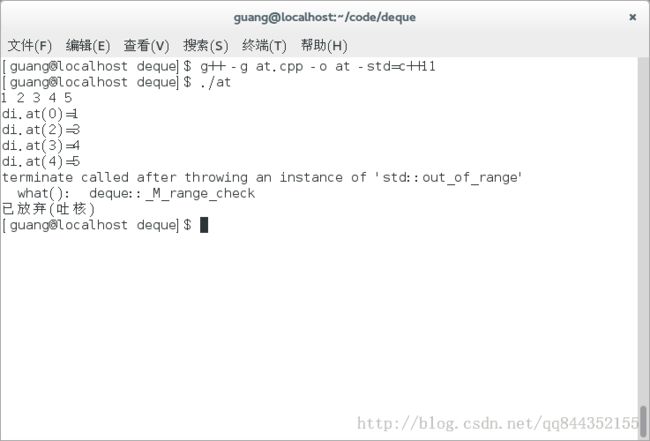STL deque的at方法(4)
std::deque::at
reference at (size_type n);
const_reference at (size_type n) const;
返回在特定位置元素的引用。
The function automatically checks whether n is within the bounds of valid elements in the container, throwing an out_of_range exception if it is not (i.e., if n is greater or equal than its size). This is in contrast with member operator[], that does not check against bounds.
该方法将自动检测n的合法性,如果n超出了范围,将抛出out_of_range异常。另一个相似的是operator[]方法,但是不会检测合法性。
例子:
#include <iostream>
#include <deque>
#include <vector>
using namespace std;
int main()
{
deque<int> di{1,2,3,4,5};
for(int i:di)
cout<<i<<" ";
cout<<endl;
cout<<"di.at(0)="<<di.at(0)<<endl;
cout<<"di.at(2)="<<di.at(2)<<endl;
cout<<"di.at(3)="<<di.at(3)<<endl;
cout<<"di.at(4)="<<di.at(4)<<endl;
cout<<"di.at(5)="<<di.at(5)<<endl;
cout<<"di.at(-1)="<<di.at(-1)<<endl;
}

返回deque容器特定位置的元素的引用。
The difference between this member function and member operator function operator[] is that deque::at signals if the requested position is out of range by throwing an out_of_range exception.
和operator[]方法不同的是at在n不合法的时候会跑出out_of_range方法。
Parameters
- n
-
Position of an element in the container.
If this is greater than the deque size, an exception of type out_of_range is thrown.
Notice that the first element has a position of 0 (not 1).
Member type size_type is an unsigned integral type.
容器内元素的位置。
需要注意第一个元素的位置为0.
Return value
The element at the specified position in the container.返回特定位置元素的引用。
Member types reference and const_reference are the reference types to the elements of the container (see deque member types).
Example
|
|
Edit & Run
|
Output:
mydeque contains: 0 1 2 3 4 5 6 7 8 9 |
Complexity
Constant.Iterator validity
No changes.Data races
The container is accessed (neither the const nor the non-const versions modify the container).Element n is potentially accessed or modified by the caller. Concurrently accessing or modifying other elements is safe.
Exception safety
Strong guarantee: if an exception is thrown, there are no changes in the container.It throws out_of_range if n is out of bounds.
如果n不再范围内将抛出out_of_range异常。
——————————————————————————————————————————————————————————————————
//翻译的不好的地方请多多指导,可以在下面留言或者点击左上方邮件地址给我发邮件,指出我的错误以及不足,以便我修改,更好的分享给大家,谢谢。
//今后的翻译将以简洁为主,翻译其主要意思,不再每句翻译。
转载请注明出处:http://blog.csdn.net/qq844352155
author:天下无双
Email:[email protected]
2014-9-1
于GDUT
——————————————————————————————————————————————————————————————————